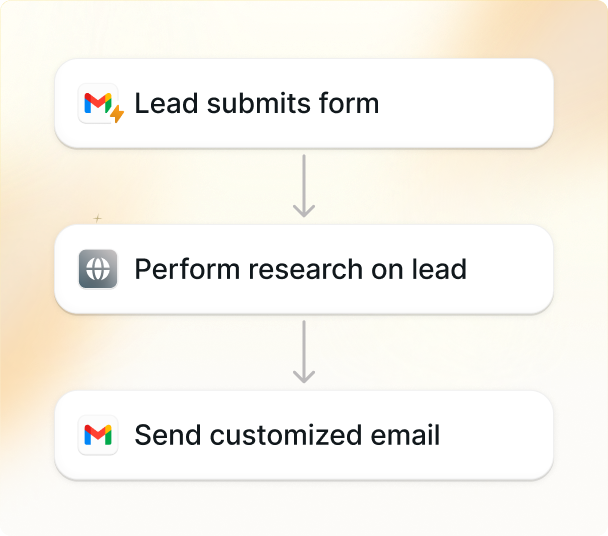Tired of sifting through Google results or struggling to find the perfect answer? Then we’ve got you — today, we’ll help you learn how to ask AI a question.
After we’re done, you’ll know where to bring all your questions, homework woes, and even personal troubles. By the end of this article, you’re going to wonder how you ever lived without being all buddy-buddy with an AI.
We’ll cover:
- Where to ask AI a question
- How do you ask an AI a question?
- How to ask AI a question about different subjects
Let’s get started!
Where to ask AI a question
If you're constantly searching for answers, need help with tasks, or want insights on the fly, Lindy's "Ask AI" feature might be what you’re after.
Here's why:
- Conversational AI = easy interaction. Powered by GPT-4, Lindy understands your questions like a person would. No need to learn complex keywords or phrasing.
- Answers in 50+ languages, so just get talkin’. Get the info you need, regardless of your preferred language.
- Ask any question, big or small. Get answers on a vast range of topics. Lindy's knowledge isn't limited to a specific field.
- Provides truly personalized responses. Lindy continuously learns from your requests and adapts its answers to match your needs and preferences.
How do you ask an AI a question?
Asking an AI a question is pretty straightforward, but here are a few tips to get the most out of a virtual conversation partner.
Let’s take a look:
- No need to get ultra-technical. AI systems these days are getting pretty good at understanding natural language, so speak to it like you would a friend. There’s no need for complex sentences or technical jargon — just ask your question in a casual, conversational tone.
- Be specific. While AI can have nuanced conversations on many topics, its knowledge comes from what it has been trained on. So if you have a very specific question, provide as much context and detail as possible. The more specific you are, the better equipped the AI will be to give you a helpful answer.
- Don’t get too personal. Avoid asking personal questions or oversharing private details. AI won't judge you or spread your secrets around, but some AI models (like Google Gemini) have human staff review conversations going as far back as 24 hours.
The flip side? AI may actually seem to be significantly more empathetic than humans at times, so we get it if you’re tempted to use it as a shoulder to lean on.
Just make sure your chosen AI respects your privacy!
- Ask follow-ups. If the AI’s initial response leaves you with more questions, ask away! Politely ask for clarification or provide more details about what you're still unsure of. The AI will use your follow-up questions to continue refining its knowledge and have an even better discussion. Just like talking with a real person, a little friendly back-and-forth can lead to the most rewarding conversations.
How to ask AI a question about:
Homework and studying
If you've got a science project due tomorrow and haven't started yet, don't worry, you can always have a chat with AI.
Say something like, "I have a biology assignment on cellular respiration. Can you give me an overview of the process and the key steps involved?"
The AI will do its best to give you a high-level explainer to get you started. Just remember, AI isn’t doing your homework for you, it’s there to help out in a pinch!
Work or a specific task
Feeling stuck on a work project or daily task? AI can provide helpful suggestions and recommendations to move things along.
Ask the AI something like, "I have a client presentation tomorrow and am struggling with how to best visually represent the data. Do you have any chart or graph recommendations that would be easy to understand and visually compelling?"
The AI can suggest options like bar charts, pie charts, scatter plots, or infographics. Pick what works for your particular data and audience.
General knowledge or news
Want to ask an AI a question about world events, science, or pop culture? Go right ahead — AI's have access to huge amounts of data and information on practically every topic.
A few examples:
- "What are the latest news headlines today?"
- "Who won the Nobel Prize for Physics this year?"
- "What movies are releasing this weekend?"
Of course, this is limited to AIs that don’t have a hard cutoff date like GPT-4. We’re talking about models like Gemini, which is connected to the internet.
Brainstorming and creative ideas
Feeling creatively blocked? Ask your AI to generate ideas, offer suggestions, or even rephrase your problem from a different angle to spark new inspiration.
Or how about feedback? While AI shouldn't replace human critique, it can point out potential areas for improvement or offer suggestions for refining your ideas.
AI can be surprisingly creative, generating options that can range from playful to practical.
Personal advice (with caution)
Feeling stressed, overwhelmed, or just need someone to listen? While AI can't replace a therapist, it can be surprisingly helpful to talk through your problems. It might remind you of helpful coping strategies, provide perspective, or simply offer a non-judgmental space to vent.
If what you need is help with decision-making, your AI can't tell you what to do, but it can help you weigh the pros and cons, or remind you of your values and goals.
Or maybe you’re feeling unmotivated. Try your AI for some encouraging words or even a simple pep talk when you need a boost.
Language learning and translation
Practice conversation with a patient AI partner. Ask questions, describe your surroundings, or practice scenarios like ordering food at a restaurant. Some AI systems that “listen” to audio can correct your pronunciation or offer more natural ways to phrase things.
Need translation on the fly? AI can translate text, websites, or even spoken words in real-time. This is invaluable for travel or navigating documents in another language.
Want to expand your vocabulary in another language? Ask your AI for synonyms if you’re in a bind.
Summing up
Now, the next time you're staring at the blinking cursor of an empty search bar, don't let your hopes fade into a 404.
Just mosey on over to an AI like Lindy, where you can get answers to your burning questions 24/7, rain or shine.
But do remember: these answers are definitely not gospel, so always take them with a grain of salt. AI systems are ever-evolving, and they’re prone to occasionally making things up (a process called “hallucination”).
They should not be a substitute for plain-ol critical thinking and fact-checking!
But, for general-purpose questions, you’ll be surprised at the level of complexity of modern AI systems.
Next steps
Lindy is not your run-of-the-mill virtual assistant. It can tackle virtually any task, including answering your burning questions.
In seconds, you can create a virtual assistant to help you out. And the best part? Each iteration can connect with each other to pool knowledge or solve tasks.
Let’s take a look at some of Lindy’s best features:
- Integrates with your tools seamlessly: Lindy connects with 3000+ apps, letting you ask it to manage your calendar, summarize documents, or handle other tasks directly.
- On 24/7: Can’t sleep and want to know at what speed the Earth moves around the sun at 4 am? Lindy won’t complain that you woke it up. It’s always there when you need it.
- Constantly learns and adapts: Lindy gets to know how you work. That means better, more personalized answers over time.
- Can be customized for any need: Whether you need in-depth analysis, quick info, or even just advice, tailor Lindy to be the assistant you've always wanted.
- Chat like you would with a friend: Lindy's powered by high-level AI, so it understands natural language.
- Answers in 50+ languages: No language barriers here – get the answers you need, regardless of how you ask.
- Big questions, small questions, it tackles them all: Lindy's knowledge base is vast, covering a huge range of topics.



